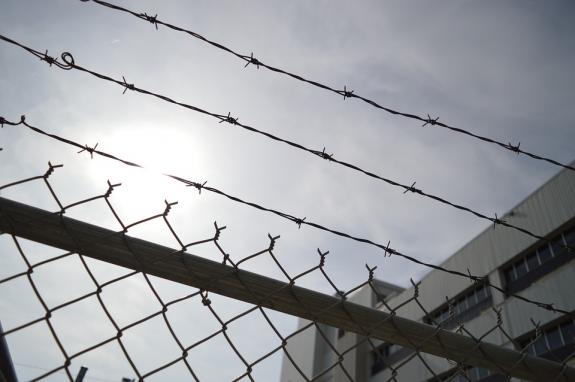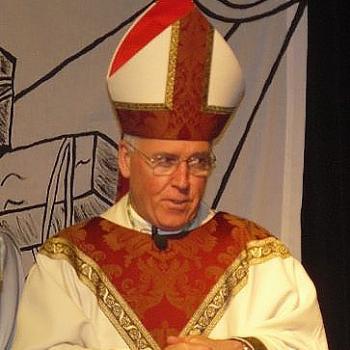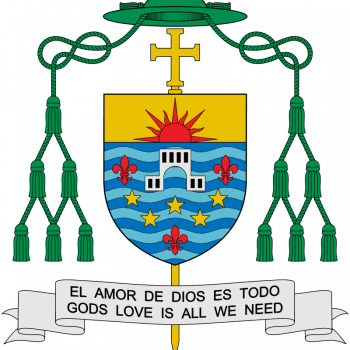The bishop of Tucson made the proposal earlier this week, and launched a firestorm of debate:
Roman Catholic Diocese of Tucson Bishop Edward J. Weisenburger attracted national attention this week when he suggested “canonical penalties” for Catholics involved in separating children from families at the border.
At the spring meeting of the U.S. Conference of Catholic Bishops this week, Weisenburger lit up social media with his suggestion of punishments under church law, such as denying Communion, to Catholics who carry out that portion of the Trump administration’s “zero tolerance” policy for border enforcement.
Under the policy, recently announced by Attorney General Jeff Sessions, children and parents who cross the border illegally, as well as some seeking asylum, may be separated from each other.
The policy was denounced by many of the bishops.
During the meeting in Fort Lauderdale, Florida, Weisenburger asked whether the Catholic bishops’ conference could make recommendations for “border bishops” like himself.
“Even though what I am saying may be risky or dangerous, I think it’s important to point out that canonical penalties are there in place to heal — first and foremost to heal,” he said. “And therefore for the salvation of these people’s souls, maybe it’s time for us to look at canonical penalties.”
Catholic church laws are outlined in the Code of Canon law.
“Canonical penalties can range from denial of sacraments to excommunication, though Weisenburger did not specify what he intended beyond referring to sanctions that already exist for ‘life issues,’” Religion News Service reported.
…Critics had a lot to say, with one calling his comments “morally hypocritical,” and another saying border agents shouldn’t be blamed for following U.S. law.
“It is extremely rare and quite remarkable that a bishop would even raise this as a possibility in a context outside of sanctioning a pro-choice Catholic politician,” John Gehring, Catholic program director at Faith in Public Life, wrote on Twitter.
“Amazing this discussion comes up in the context of immigration when for years the bishops have studiously avoided canonical penalties for the scandal of pro-abortion Catholic politicians receiving Communion,” tweeted Kevin M. Cusick, a Catholic priest and retired Navy chaplain.
Several months back, canon lawyer and blogger Ed Peters wrote about applying penalties to those who vote in favor of abortion. Specifically, he addressed the “Bloody 14” who voted against outlawing abortions after 20 weeks. Could they be excommunicated? Denied communion? It’s more complicated than some may think. His thoughts:
First, as has been explained many times, the hideous deed committed by the Bloody 14 is not, standing alone, a crime under canon law and, even if combined with other such acts as many of the Bloody 14 have taken, is not a crime for which excommunication is the penalty (Canon 1369). Specifically, voting pro-abortion is not ‘procuring an abortion’ for purposes of Canon 1398 and so no excommunication for procuring abortion applies in response to voting for it. Catholics contacting chanceries and demanding excommunications, therefore, will be noted on the “Uninformed Critics” list and comfortably ignored—this time, with some reason.
Second, a single act, again, no matter how objectively gravely sinful it is, does not trigger the duty of Catholic ministers to withhold holy Communion under Canon 915 which canon operates in the face of obstinate perseverance in manifest grave sin. Catholics contacting chanceries and demanding the withholding of holy Communion, therefore, will be noted on the “They Are on to Something but have Jumped the Gun” list and un-comfortably ignored—though again with some reason.
To my knowledge, Dr. Peters hasn’t weighed in on the latest canonical contretemps. Stay tuned.
Meantime, the USCCB president Cardinal Daniel DiNardo issued a statement denouncing the enforcement of laws separating parents from their children when they enter this country illegally:
“At its core, asylum is an instrument to preserve the right to life. The Attorney General’s recent decision elicits deep concern because it potentially strips asylum from many women who lack adequate protection. These vulnerable women will now face return to the extreme dangers of domestic violence in their home country. This decision negates decades of precedents that have provided protection to women fleeing domestic violence. Unless overturned, the decision will erode the capacity of asylum to save lives, particularly in cases that involve asylum seekers who are persecuted by private actors. We urge courts and policy makers to respect and enhance, not erode, the potential of our asylum system to preserve and protect the right to life.
Additionally, I join Bishop Joe Vásquez, Chairman of USCCB’s Committee on Migration, in condemning the continued use of family separation at the U.S./Mexico border as an implementation of the Administration’s zero tolerance policy. Our government has the discretion in our laws to ensure that young children are not separated from their parents and exposed to irreparable harm and trauma. Families are the foundational element of our society and they must be able to stay together. While protecting our borders is important, we can and must do better as a government, and as a society, to find other ways to ensure that safety. Separating babies from their mothers is not the answer and is immoral.”













